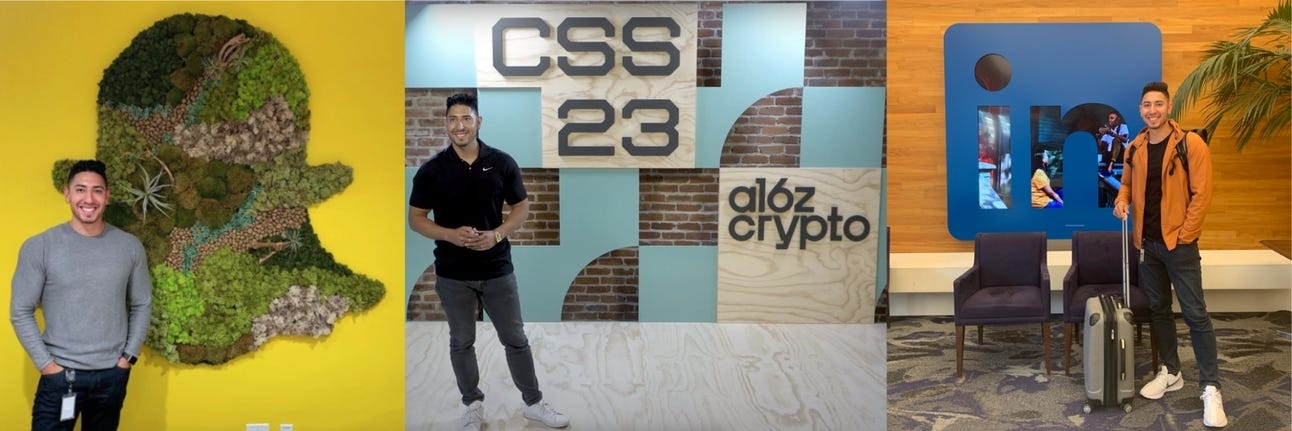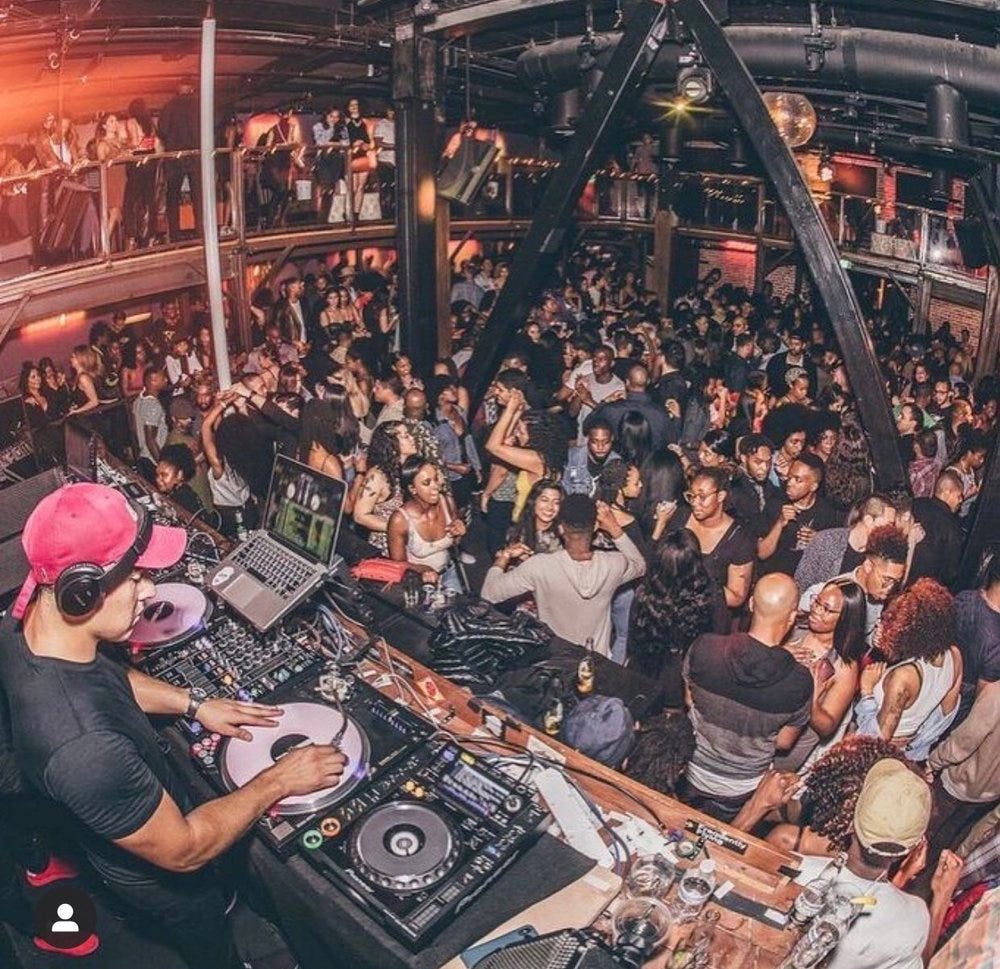10 Lessons from 10 Years in Tech (a16z, LinkedIn, Snap)
What I learned from working with top performers throughout my career.
I recently shared on X that I was no longer working full-time at a16z.
I am still working with the team, but as a part-time consultant.
I made the change in order to have the creative freedom to build Internet Empires and do fun stuff like this newsletter.
I’m writing this newsletter because a friend, Jay Clouse did an incredible podcast about how creators are using Substack, and I decided to give it a try.
What to expect from this series:
Building in public
Experiments (and results)
Personal lessons, insights, & stories
My favorite tools, tactics, & resources
If you enjoy my work and want to support, consider subscribing
For content about internet entrepreneurship & growing your distribution, click here.
Ok, back to my career update.
Since transitioning a few weeks ago, I realized I had completed 10 years in tech.
Well, 10 years and 7 months, but who’s counting? 😂
I’ve been pretty lucky to have worked with some incredible people throughout my career at LinkedIn, Snap, a16z, and a social media food startup (long live Crave It).
So here are my 10 lessons from working with high performers in tech.
Top Performers Hang with Top Performers
The people you work with, hang out with, and regularly communicate with will heavily influence the direction of your career and overall life. This is why there’s such a high density of talent in cities like SF & NYC. Top performers want to spend as much time as possible with other top performers.
I’ve seen people take pay cuts to work at a different company because they had a high density of top performers. Years later, they inevitably catapulted past all of their industry peers since they were able to learn faster, associate with the right people, and get measurable results.
Iron really does sharpen iron. So if you surround yourself with people who are the best at what they do, it will inevitably pull the best out of you.
The happiest, hardest-working, and highest-output people I’ve met are super intentional about their circle. This also means actively pruning people who are pessimistic, toxic, or just vibe-killers overall.
Compound Learning Machines
I wrote a self-development book while I was working at Snap, and one of the key takeaways from studying high-performers around me + through history, was that they were all Compound Learners.
Compound Learning (defined by me):
“Observing, picking up trends, asking questions, paying attention to nuances, implementing & tying things to back your specific goal. The key to compound learning is being intentional with how you view the world, pick up information & learn daily.” - ya boy, Ish Verduzco
Top performers are constantly asking questions tied to a specific goal they are working on, observing people/trends around them, and adding to their mental dataset. They use regular, everyday interactions to learn about the topic that they’re trying to conquer. And they’re learning machines, constantly binging podcasts, blog posts, documentaries, books, attending workshops, taking online courses, etc.
I never realized how unique this was until I moved out of San Francisco. Simple interactions like “Which books/podcasts are you currently obsessed with?” got swapped with “Which Netflix shows are you watching?”.
Personal Board of Advisors
Not everyone calls it this, but all top performers have one.
I first learned about it through one of my mentors back in 2016. He was telling me about a business he was about to start and how he was shopping around the idea to his personal board of advisors — mentors, old bosses, close friends, and people who he highly respected. I was shook. It is so smart to have a handful of people from different backgrounds, careers, and points of view to give feedback on an idea or ask questions that would help you think.
Today, my personal board of advisors consists of founder friends, a few CEOs & VPs at Fortune 500 companies, tenured friends who always give me no-bullshit answers and tell me how it is, old bosses, and more. Whenever I have a really big move that I’m about to make (like leaving my full-time job to do this creator/consultant thing), I always shop the idea past them for feedback and input.
Note: When doing the above in point “c” I’m not looking for an approval or trying to justify the idea, I am simply presenting the idea along with my logic and asking if they are seeing something that I’m not — essentially trying to pressure test the idea with a different perspective.
High Agency Accelerates Relationship Building
Always following through with your word, doing what you say you will do, and becoming known as high agency is a superpower when it comes to building relationships.
When people see you this way, they will usually trust you more and be willing to open up much faster. Conversations go deep, surface-level questions are avoided, and long-lasting relationships are built.
The interesting thing I’ve noticed is that this can also be done virtually by sharing updates online. Building in public, sharing accomplishments, and hurdles along the way has a similar effect. When you eventually meet those people in person, they will feel like they know you (leading to more trust).
The Luckiest Ones Work the Hardest
The people who are at the top of what they do always work the hardest, even if they make it seem like they don’t. Nights, weekends, after-hours, working on vacation, and everything in between. Sometimes they’ll go through seasons of rest, but always followed by a season of hard work to get to the next level.
These are the people who seem to always get the promotion, job opportunity, raise a round of funding, sell their company, crush their user acquisition goals, and do things that their “peers” find themselves stuck on.
There’s simply no workaround for hard work.
Charisma Can (and Should) Be Learned
I think most people would agree that charisma is a valuable trait to have. It opens up doors and increases the surface area for luck to happen to you.
Charismatic people spark conversations, establish relationships, and are usually the superconnectors amongst groups, which is an invaluable skillset to have. But what most people might not know is that you can work on your charisma if you are intentional about it.
How to be more charismatic:
Be the one who starts conversations
Listen carefully to what people have to say
Ask thoughtful questions about others, their life, interests, work, family, and hobbies
Make people feel comfortable, seen and respected — this means using eye contact, showing open/relaxed body language, and having genuine interest in what others have to say
Be willing to get personal and share about yourself — people appreciate openness & vulnerability
Be helpful — provide insights, feedback, ideas, and open up your network if needed to help them achieve their goal
Obsession Beats Talent
I’ve seen time and time again that people who are completely obsessed with something will outperform those who are talented but lazy.
The obsessed will do everything to learn about a subject, spend every waking moment thinking about how to improve, and will compound much faster than those who have a natural knack for the topic.
Obsession leads to unique career paths (more about this in point #8)
You Can Carve Your Own Path
Top performers create their own jobs and career paths, even when the role or route doesn’t exist yet.
I wrote my own job description at LinkedIn, a close friend took his niche role and launched a company providing that exact service (now makes 20x his salary), and a recruiter friend took a career pivot as a creator — now has 1M IG followers, plus, a thriving business helping people land their dream jobs.
Just because the role doesn’t exist doesn't mean it can’t be done.
Public Speaking is a Superpower
In an increasingly digital world, public speaking is becoming more important.
I’ve seen people speedrun their careers and get opportunities they wouldn’t have otherwise gotten simply by putting themselves out there (and crushing it in their job, of course)
There are a bunch of hacks to get better at public speaking, but the only way I’ve been able to improve myself is by doing it a ton. I’m still not great at it and get nervous every time, but I’ve found that repetition helps. This means running through a presentation 50-100 times, really knowing what I’m talking about (vs memorizing), and being flexible enough to make on-the-fly adjustments based on the audience’s engagement.
Pro Tip: Put yourself in situations where you are forced to speak or join the conversation. When in a group setting, initiate the conversation by asking a question or making a joke — this helps you feel more comfortable since you broke the ice and will make the next time you speak a bit easier.
Have a hobby
This might sound counterintuitive to everything I’ve shared about top performers thus far, since you’d think they spend all of their time and energy on their work, but it’s simply not true.
Top performers usually have a hobby that they take very seriously. I think it helps them unplug from their work, allows their brain to rest, and marinate the ideas they’ve been pondering.
Some cool hobbies I’ve seen from top performers
A Senior Vice President who is a producer/DJ on the weekends
Tons of marathon and triathlon athletes who are also at the top of their fields of work
A product manager who doubles as one of the most followed creators on LinkedIn
A lead recruiter who was also an amateur bodybuilder and won 1st place in his first competition
A salesman (top 5%) who also had a travel vlog on YouTube with hundreds of thousands of followers
As for me, I spent the first half of my professional career DJing. Every single Friday & Saturday night, performing in San Francisco, and eventually going on a US tour with pit stops in NYC, Miami, LA, Seattle, Portland, and even Las Vegas. The funny thing is, it was also the perfect icebreaker when talking to people in tech. CEOs, SVPs, and Startup Founders would often ask about it. Pretty awesome to have these relationships so early in my career.
There’s something about having a passionate hobby that makes you more interesting, likable, and approachable, which I think scales nicely when you leverage social media to share who you are.
The SVP of talent who I mentioned in point “c) i” is now a close friend of mine for the past 9 years and is someone who I consider part of my personal board of directors. I don’t think we would have had the same relationship if I didn’t have this hobby.
Find a hobby, take it seriously, have fun, and share with others. It will make people gravitate towards you.
Thank you for tuning in.
If you like my writing and want to support the journey, consider subscribing.
Cheers,
Ish
p.s. Drop a comment if there’s something you'd like me to cover in the future.



